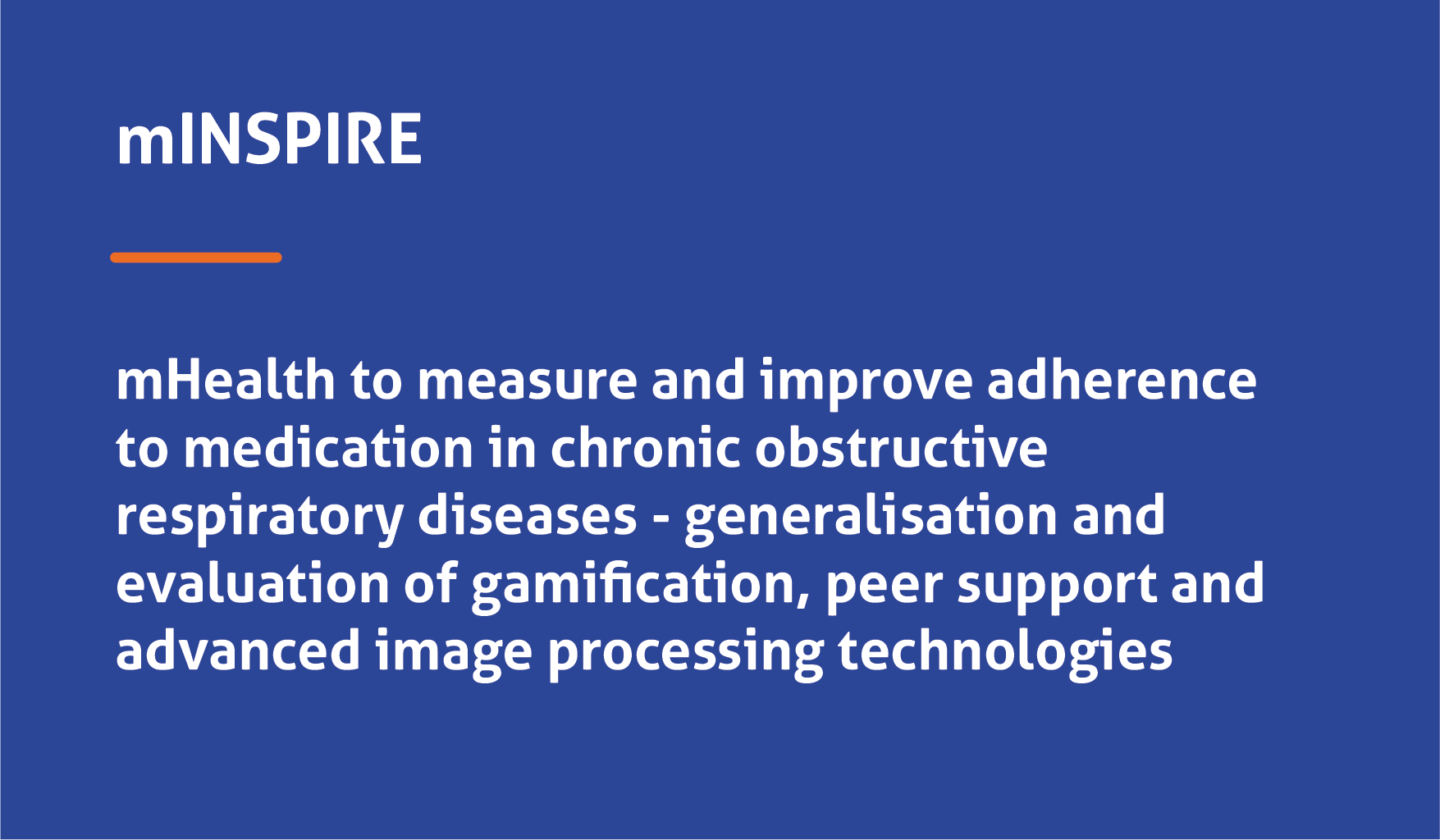Project Description
mINSPIRE – mHealth to measure and improve adherence to medication in chronic obstructive respiratory diseases – generalisation and evaluation of gamification, peer support and advanced image processing technologies
mINSPIRE will improve and evaluate mobile technologies to measure and improve inhaled medications adherence (IMA) in chronic obstructive respiratory diseases.
The team has developed an app aiming to transform IMA into a positive experience through gamification and social support, while allowing for verified IMA monitoring.
The most innovative technology is the medication adherence detection tool based on advanced image processing to collect IMA using the smartphone camera. mINSPIRE project will generalise the tool to all inhalers and also broaden the IMA monitoring to oral medications. Importantly, the project will evaluate the app concept and mobile technologies. By the end of the project, the app final version will be available and the magnitude of its effects determined. The mInspirers app will promote patient-clinician shared therapeutic decisions andinnovating healthcare services, contributing to more sustainable healthcare systems.
Abstract
Chronic Obstructive Respiratory Diseases (CORD) such as asthma and chronic obstructive pulmonary disease, are high burden diseases throughout the life cycle and are already the 3rd cause of death and the 5th cause of hospitalisations due to disease. Medication adherence in chronic diseases is about 50% and in CORD adherence to inhaled medication (IMA) is even lower. This is associated with poor disease control and exacerbations, leading to disease progression and increasing health costs. mINSPIRE will develop and test mobile technologies to measure and improve IMA in CORD.
mHealth technologies are highly promising to improve IMA. Smartphones are common, portable, personal and connected. The combination of computation, interactive communication and the display ability with gamification and social support has the potential to shape health behaviours and contribute to patient-centric, personalized healthcare.
Moreover, the use of smartphones embedded sensors and advanced signal processing to deliver IMA measurement tools will allow for low cost, ubiquitous implementation of interventions to improve IMA.
The team has developed an innovative app with the goal of transforming IMA into a positive experience through gamification and social support, while allowing for ubiquitous and objective IMA monitoring by using the smartphone camera and advanced image processing. Currently, the tool is at a proof-of-concept stage (TRL 3) working with one type of inhaler. The image processing techniques need to be generalised to the other types of inhalers and to oral medications. Also, this new app concept and technologies need to be evaluated before studying its effectiveness in large RCTs.
Thus, mINSPIRE aims to: 1. generalise the image-based medication adherence detection tool to all inhaler types and to oral medications; 2. assess the feasibility and validity of the app; 3. produce the final version of the app; 4. investigate the magnitude of effect of the app on IMA and on clinical outcomes.
By the end of this project, the final validated version of the app will be available and its potential effect established (increasing its TRL from 3 to 8). The planned app – as a data collecting tool both for IMA and for symptoms/disease status – will promote patient active involvement, patient-clinician shared decision-making. It will inform therapeutic decisions and contribute to innovation in digital healthcare services. In the long-term, mINSPIRE is expected to improve adherence to inhaled and oral therapies in CORD, but also in other chronic diseases. It has great potential for prescription optimization and to more sustainable healthcare systems.
Funding Institution
Portugal 2020
Global Budget
238.679,53 euros
CINTESIS Budget
238.679,53 euros
Reference
POCI-01-0145-FEDER-029130
CINTESIS researchers involved
João Almeida Fonseca (PI), Altamiro da Costa Pereira (Co-investigador responsável), Rute Almeida, Cristina Jácome, Ana Margarida Ferreira, Mariana Couto, Pedro Vieira Marques, Tiago Jacinto

